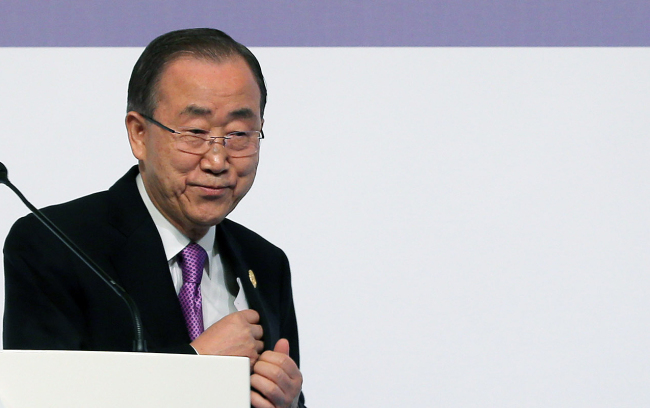Talk of U.N. Secretary-General Ban Ki-moon’s visit to Pyongyang resurfaced Monday following a news report of a trip, possibly this week, to help set the stage for addressing a set of North Korea issues including its nuclear program.
 |
| U.N. Secretary-General Ban Ki-moon attends the G-20 summit in Turkey on Sunday, local time. (Yonhap) |
Yonhap news agency reported that the South Korean secretary-general would visit the North’s capital city after his plan to travel to the North fell through in May due to the communist regime’s rejection. In response, the U.N. spokesperson’s office said it had “no comment.”
Should he go to Pyongyang, it would be the first visit by an incumbent U.N. leader in 22 years. Boutros Boutros-Ghali, who headed the U.N. from 1992-96, visited Pyongyang in 1993, while Kurt Waldheim, who led the U.N. from 1972-81, visited the North in 1979.
The U.N. spokesperson’s office refused to comment on the report.
“The secretary-general has always said that he is ready to play any role in order to help enhance dialogue, stability and peace on the Korean Peninsula,” it said in an email sent to the media.
“As for any future plans by the secretary-general to travel to the Democratic People’s Republic of Korea (North Korea), we have no further comment at this time.”
Cheong Wa Dae said it has no knowledge of Ban’s plan to visit the North.
“We have never heard of it. There is nothing for us to say at this point,” a senior Cheong Wa Dae official told media.
Some observers remained skeptical about Ban’s reported plan to travel to Pyongyang. They noted that it is not good timing given that the world is in mourning over the victims of last week’s terrorist attacks in France, and that Ban has a set of pending issues including a global climate change gathering to begin late this month in Paris.
Ban planned to visit the inter-Korean industrial complex in the North’s border city of Gaeseong in May. But Pyongyang abruptly canceled his visit without elaborating on the reasons for the rejection. Observers say Ban’s remarks against Pyongyang’s potential launch of a rocket might have angered the North.
Ban’s reported plan to visit emerged as there has not been any significant progress in Seoul’s efforts to improve cross-border ties despite growing bilateral civilian exchanges.
In line with the Aug. 25 deal to defuse military tensions and enhance bilateral relations, Seoul has proposed government talks with Pyongyang three times since late September.
But Pyongyang has spurned the proposals, arguing that they were insincere due to South Korean civic groups’ continued distribution of anti-Pyongyang leaflets and Seoul’s criticism of Pyongyang’s potential provocations including a possible rocket launch and other issues.
Analysts said that if Pyongyang has accepted Ban’s visit, it might want to use the U.N. to ease international pressure over its woeful human rights record, and nuclear and missile programs.
“As the U.N. is at the forefront of applying international sanctions against the North, Pyongyang may want to utilize Ban to help ease pressure against it vis-a-vis its nuclear program, human rights issues and others,” said Chang Yong-seok, a senior analyst at Seoul National University’s Institute for Peace and Unification.
He added that the North could also raise the issue of a peace treaty with the U.S., an issue that observers say the North seeks to utilize to divert international attention to the issue of its denuclearization.
“Given the role of the U.S. to promote world peace and stability, Pyongyang might try to raise the issue of a peace treaty to replace the current armistice agreement,” Chang said.
By Song Sang-ho (sshluck@heraldcorp.com)

